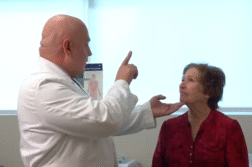MIAMI, Fla. (Ivanhoe Newswire) — An estimated 5.7 million Americans are living with Alzheimer’s disease. And that number is expected to grow to 14 million by the year 2050. So far, there is no cure, but scientists continue to look for therapies that would slow the progress of some symptoms.
After 60 years of marriage, Frank and Juanita Buggs have made many memories together.
Frank said, “We have two children and four grandchildren and two great grandchildren.”
But ten years ago, Frank noticed changes in his wife’s memory. She was diagnosed with Alzheimer’s disease. Marc Agronin, MD, Senior Vice President for Behavioral Health at Miami Jewish Health says the disease can start with short-term memory deficits, but then progresses. And because Alzheimer’s causes inflammation in the brain it can also lead to behavioral changes.
“We see changes in mood, people get very reactive to situations, stressful situations, they get very anxious or sometimes depressed,” said Dr. Agronin.
At night, Juanita gets aggravated when Frank is trying to give her her medication.
“Why am I taking this? Who told you to give this to me?” Frank explained.
Frank found out about a clinical trial at Miami Jewish health studying a drug to help Alzheimer’s patients with agitation.
“She participated in the double blind, placebo-controlled portion of the study,” said Ricardo D. Castañeda, PharmD, Director Of Clinical Research & Business Development at Miami Jewish Health.
Now Juanita gets the experimental drug by Avanir pharmaceuticals as part of the open label extension.
“It’s going to help somebody,” Frank told Ivanhoe.
Frank knows this medication may not mean big changes for Juanita, but he has his eye on the future.
Frank said, “We just need to find a cure soon.”
Giving hope to other patients down the road.
Researchers are also studying stem cell therapy and immunotherapy, using the body’s own immune system to attack the disease, in the fight against Alzheimer’s. For more information on prevention call 305-514-8710, or for the latest on clinical trials please visit www.miamijewishhealth.org or www.clinicaltrials.gov
Contributors to this news report include: Janna Ross, Field Producer; Judy Reich, Videographer; Cyndy McGrath, Supervising Producer; Hayley Hudson, Assistant Producer; Roque Correa, Editor.
To receive a free weekly e-mail on Medical Breakthroughs from Ivanhoe, sign up at: http://www.ivanhoe.com/ftk
MEDICAL BREAKTHROUGHS
RESEARCH SUMMARY
TOPIC: CALMING AGITATION IN ALZHEIMER’S PATIENTS
REPORT: MB #4536
BACKGROUND: Alzheimer’s disease is the most common type of dementia. This is a progressive disease that causes brain decline over time. For every 1,000 people between the ages of 65 and older, there are 50 new diagnoses a year. The exact cause of the disease is not yet fully understood, but it is caused by the failure of two main brain proteins. The first is plaque containing beta amyloid building up in the brain, and the second is tau protein, which creates tangles that disrupt the transport system and are toxic to cells. This causes problems in more than just memory. Patients also have impaired reading, writing, speech and reasoning. Their sight could also be affected; their ability to exercise judgement and complete complex tasks is hindered, and they could start to change their personality.
(Source: https://www.mayoclinic.org/diseases-conditions/alzheimers-disease/symptoms-causes/syc-20350447 https://www.medicalnewstoday.com/articles/159442.php )
TREATMENTS: When diagnosing dementia, doctors take into account family medical history and perform some tests. They will look at the medications you take, look at your blood pressure, listen to the heart and lungs and look at your blood. They will also administer a neurological exam which will look at your reflexes, speech, eye movement, and coordination, among other things. They will also look at the brain through MRIs and CT scans. Doctors may also administer a memory test called the mini-mental state exam. The highest score is a 30, with scores in the mid to low 20s being mild dementia, 13-20 being moderate and below 12 is severe dementia. Over time, Alzheimer’s patients lose 2-4 points each year.
(Source: https://www.alz.org/alzheimers-dementia/diagnosis/medical_tests
NEW TECHNOLOGY: There are many medications that can be taken to try to save the memory of a patient. The two most common types of FDA approved medications are memantine and cholinesterase inhibitors. Though they can’t restore dead cells, they can stabilize symptoms for a limited time. A new study is showing signs of helping Alzheimer’s patients with their mood swings. The Miami Jewish Health Center is testing a drug, Eli Lilly (TrailBlazer-ALZ) 15T-MC-AACG that could also stabilize this process over six months. Dr. Marc Agronim says that researchers are trying trials like this to improve cognition and provide wellness. Another possible treatment being tested is immunotherapy, which would get the immune system to attack the disease itself.
(Source: https://www.miamijewishhealth.org/wp-content/uploads/2019/01/Clinical-Trials-at-MJH-Jan-2019.pdf https://www.alz.org/alzheimers-dementia/treatments/medications-for-memory )
FOR MORE INFORMATION ON THIS REPORT, PLEASE CONTACT:
Sallie James, PR Miami Jewish Health
305-751-8626
If this story or any other Ivanhoe story has impacted your life or prompted you or someone you know to seek or change treatments, please let us know by contacting Marjorie Bekaert Thomas at mthomas@ivanhoe.com




